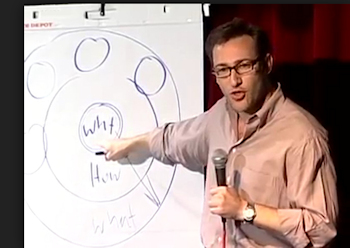What do you do for a living? What sort of business do you run?
That’s a classic business question, and those who understand marketing and PR, and have been in business during the last decade, might respond to the questions with their “elevator pitch.”
If you’re not familiar with that term “elevator pitch”, you should be. An elevator pitch is a 10-20 second (yes, second!) overview of your business, so-named because you should be able to deliver it to a fellow passenger in the time it takes you to share an elevator ride to the top floor of a not-very-tall building.
I’m the founder and CEO of Jane’s Advocacy Services in Terre Haute. We provide health care support and navigation services for older patients who need someone to hold their hands. Unlike hospital patient advocates or social workers, we can be there 24/7, at home or in the hospital. We provide peace of mind to our clients and their concerned adult children.
Thing is – elevator pitches are just so 2008! They may still have their place but they have mostly been replaced…
A few years ago, I introduced you to the concept of “narrative.” I first heard the term while watching an episode of Shark Tank, when Troy Carter asked a hopeful investee, “What’s your narrative?”
Now – here’s what captured my attention… the woman manufactured socks. Yes, socks. Big deal! I mean, they were cool socks, I grant you. But Shark Tank cool?
And then she told her story, her narrative. It was heartbreaking and hopeful. It captured hearts and minds. And the Sharks couldn’t invest fast enough… all based on her narrative.
Advocacy is the kind of business for which narrative can be incredibly powerful! So many of us do the work we do because of our own experiences dealing with the healthcare system for ourselves, or for others. By helping others, using the skills and empathy we have developed, we find joy, possibly catharsis, and often career.
My work is about patient empowerment and patient advocacy. In 2004, I was diagnosed with terminal lymphoma and given just a few months to live. I figured out on my own I had been misdiagnosed – the doctors and pathologists were wrong. I’ve never had any form of treatment. Afterwards, I realized that if that had happened to me, it could happen to anyone, so I took my post-misdiagnosis anger and turned it into a campaign to help others empower themselves, or find someone who could help them. I do that through writing, speaking, and supporting independent patient advocates.
Oh, so much more powerful and compelling than an elevator pitch when it comes to audiences like potential clients, or even the media.
But now, in 2017, let’s enhance narrative to provide a boost to advocacy marketing by asking:
What do you believe?
Why?

I was introduced to this marketing concept by Linda Adler, who has been co-teaching APHA Workshops with me, when she shared a TED Talk by Simon Sinek called How Great Leaders Inspire Action.
Sinek has researched different approaches to this question of “what do you do” and postures that the concept of WHY is far more powerful than WHAT or HOW. He suggests that when businesses share their values as the central focus of their marketing, it will propel them forward.
One of his key examples is illustrated by looking at the different approaches used by Apple -vs- (say) Dell or Gateway.
- Dell or Gateway, when asked what they do, would respond with “we build good, powerful computers.” Kind of elevator-speech-ish.
- But Apple’s response is more like, “We believe people should be able to work the way they want to work. We believe our computers (or phones or iPads or watches) can help you achieve what you want to achieve.”
Whoa. That’s like narrative-on-steroids, right? Even if you’re not an Apple/Mac worshiper, you can see the power behind those statements. Further, the differences in success levels, or the regard in which Apple-vs-Dell or Gateway are held in the marketplace are clear.
Why? Because we believe the same thing! We share those values!
By leading with one’s belief system, an individual or business will develop followers, drinkers of their kool-aid, who will not only buy-in themselves, but will evangelize on their behalf, too. Sinek provides an additional excellent example in Martin Luther King. We all know exactly what he believed, and we all know the extent to which he attracted followers and evangelists, and continues to do so.
I believe…. And this is WHY!
So – what do YOU believe? Why do you believe it? And how can you frame your beliefs to help others understand your work, buy in to it, remember it, and want to work with you because they share your beliefs? You can create for yourself a statement of belief for your marketing that accomplishes all of that to propel your practice.
I believe everyone deserves to get the best of the healthcare system. But I also know it’s not always readily available because I had a terrible experience myself which almost cost me my life, and certainly cost me my savings. I believe that because we don’t know what we don’t know, and because our profit-driven system doesn’t always offer us good options, it may require an expert like me to help you get optimum care. My work is about supporting you, the patient or caregiver, because I believe you deserve good healthcare, too.
Since being introduced to Sinek’s “believe” concept, I’ve tried it out on a few folks. They understand it instantly, and each one responds with their own beliefs – our shared values. So now, not only do they better understand what I do for a living, we SHARE OUR BELIEFS. So very powerful.

You, too, believe in something that drives your work!
You, too, can frame your advocacy and your practice as an “I believe statement.”
You, too, can propel your advocacy practice by using that statement consistently in your marketing, including everyday conversations.
In fact, you, too, can share your “I believe statement” below. So please do!
LEARN ABOUT APHA MEMBERSHIP | REASONS PATIENTS NEED ADVOCATES | MASTER LIST OF PRACTICE RESOURCES





